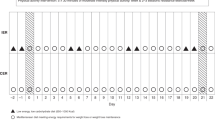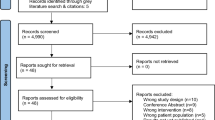Abstract
Objective:
Patients with rectal cancer receive curative radiotherapy towards the pelvis for 5 weeks. Little is known about the impact of radiotherapy on dietary intake and nutritional status. The objective was to examine whether curative radiotherapy for rectal cancer promoted altered intake of energy and nutrients, and change in nutritional indicators.
Design:
Prospective study.
Setting:
Department of Oncology in a tertiary care hospital.
Subjects:
A total of 31 consecutive patients receiving radiotherapy for rectal cancer (50 Gray).
Interventions:
A 7-day food intake registration, body weight, upper arm circumference, and analyses of blood samples were performed at the start and the end of radiotherapy, and at follow-up 4–6 weeks and 1 year after the end of radiotherapy.
Results:
At the end of 5 weeks of radiotherapy, the mean daily energy intake was reduced by 15% from 8.9 to 7.6 MJ as compared with baseline (P=0.002), and the intake of several nutrients was reduced (P<0.01). The percentages of energy derived from fat, protein, and carbohydrates did not change, nor did the nutrient density. A transient body weight reduction of<1 kg was observed (P=0.009). Serum concentrations of vitamin A and 25-OH vitamin D did not change during radiotherapy. The daily intake of energy and nutrients, and body weight, had increased towards pretreatment values 4–6 weeks after radiotherapy.
Conclusions:
Radiotherapy for rectal cancer caused a transient reduction in energy intake and nutritional indicators. The nutritional quality of the diet was unchanged during radiotherapy.
Sponsorship:
The first author was a research fellow funded by the Norwegian Cancer Society.
This is a preview of subscription content, access via your institution
Access options
Subscribe to this journal
Receive 12 print issues and online access
$259.00 per year
only $21.58 per issue
Buy this article
- Purchase on Springer Link
- Instant access to full article PDF
Prices may be subject to local taxes which are calculated during checkout
Similar content being viewed by others
References
Aaronson NK, Ahmedzai S, Bergman B, Bullinger M, Cull A, Duez NJ et al. (1993). The European Organization for Research and Treatment of Cancer QLQ-C30: a quality-of-life instrument for use in international clinical trials in oncology. J Natl Cancer Inst 85, 365–376.
Bauer J, Capra S, Ferguson M (2002). Use of the scored Patient-Generated Subjective Global Assessment (PG-SGA) as a nutrition assessment tool in patients with cancer. Eur J Clin Nutr 56, 779–785.
Becker W, Lennernas M, Gustafsson I-B, Haraldsdottir J, Nydahl M, Vessby B et al. (1998). Precoded food records compared with weighed food records for measuring dietary habits in a population of Swedish adults. Scand J Nutr 42, 145–149.
Blaker B, Aarsland M (1989). Household Measures and Weights of Foods. National Association for Nutrition and Health: Oslo. (in Norwegian).
Bruning PF, Egger RJ, Gooskens AC, Hermus RJ, Hulshof KF, Kistemaker C et al. (1985). Dietary intake, nutritional status and well-being of cancer patients: a prospective study. Eur J Cancer Clin Oncol 21, 1449–1459.
Bye A, Ose T, Kaasa S (1993). The effect of a low fat, low lactose diet on nutritional status during pelvic radiotherapy. Clin Nutr 12, 89–95.
Detsky AS, McLaughlin JR, Baker JP, Johnston N, Whittaker S, Mendelson RA et al. (1987). What is subjective global assessment of nutritional status? J Parenter Enteral Nutr 11, 8–13.
Guren MG, Dueland S, Skovlund E, Fossa SD, Poulsen JP, Tveit KM (2003). Quality of life during radiotherapy for rectal cancer. Eur J Cancer 39, 587–594.
Henriksen C, Helland IB, Ronnestad A, Gronn M, Iversen PO, Drevon C (2005). Marked differences in plasma fat-soluble vitamins between very low birth weight and normal birth weight infants. Eur J Clin Nutr (Submitted).
Hulshof KF, Gooskens AC, Wedel M, Bruning PF (1987). Food intake in three groups of cancer patients. A prospective study during cancer treatment. Hum Nutr Appl Nutr 41, 23–37.
Isenring E, Bauer J, Capra S (2003). The scored Patient-generated Subjective Global Assessment (PG-SGA) and its association with quality of life in ambulatory patients receiving radiotherapy. Eur J Clin Nutr 57, 305–309.
Isenring EA, Capra S, Bauer JD (2004). Nutrition intervention is beneficial in oncology outpatients receiving radiotherapy to the gastrointestinal or head and neck area. Br J Cancer 91, 447–452.
Johansson L, Solvoll K (1999). Norkost 1997. National dietary survey among men and women age 16–79 years. The National Council on Nutrition and Physical Activity: Oslo. Report no. 2/1999 (in Norwegian).
National Nutrition Council (1997). Norwegian Nutrition Recommendations 1997. National Nutrition Council: Oslo.
Ottery FD (1996). Definition of standardized nutritional assessment and interventional pathways in oncology. Nutrition 12, S15–S19.
Pia DLM, Gotteland M, Ramirez C, Araya M, Yudin T, Bunout D et al. (2001). Acute nutritional and intestinal changes after pelvic radiation. J Am Coll Nutr 20, 637–642.
Ravasco P, Monteiro-Grillo I, Camilo ME (2003a). Does nutrition influence quality of life in cancer patients undergoing radiotherapy? Radiother Oncol 67, 213–220.
Ravasco P, Monteiro-Grillo I, Vidal PM, Camilo ME (2003b). Nutritional deterioration in cancer: the role of disease and diet. Clin Oncol (R Coll Radiol) 15, 443–450.
Sprangers MA, te Velde A, Aaronson NK (1999). The construction and testing of the EORTC colorectal cancer-specific quality of life questionnaire module (QLQ-CR38). European Organization for Research and Treatment of Cancer Study Group on Quality of Life. Eur J Cancer 35, 238–247.
Tchekmedyian NS, Zahyna D, Halpert C, Heber D (1992). Assessment and maintenance of nutrition in older cancer patients. Oncology (Huntingt) 6, 105–111.
Thomas MK, Lloyd-Jones DM, Thadhani RI, Shaw AC, Deraska DJ, Kitch BT et al. (1998). Hypovitaminosis D in medical inpatients. N Engl J Med 338, 777–783.
Tveit KM, Guldvog I, Hagen S, Trondsen E, Harbitz T, Nygaard K et al. (1997). Randomized controlled trial of postoperative radiotherapy and short-term time-scheduled 5-fluorouracil against surgery alone in the treatment of Dukes B and C rectal cancer. Norwegian Adjuvant Rectal Cancer Project Group. Br J Surg 84, 1130–1135.
Van Cutsem E, Dicato M, Wils J, Cunningham D, Diaz-Rubio E, Glimelius B et al. (2002). Adjuvant treatment of colorectal cancer (current expert opinion derived from the Third International Conference: Perspectives in Colorectal Cancer, Dublin, 2001). Eur J Cancer 38, 1429–1436.
Vantongelen K, Hawthorn J (1993). A Practical Guide to EORTC Studies. EORTC: Brussels.
WHO (1998). Obesity. Preventing and managing the global epidemic. WHO: Geneva. Report of a WHO consultation on obesity.
Yeoh E, Horowitz M, Russo A, Muecke T, Robb T, Maddox A et al. (1993). Effect of pelvic irradiation on gastrointestinal function: a prospective longitudinal study. Am J Med 95, 397–406.
Acknowledgements
The first author was a research fellow of the Norwegian Cancer Society.
Author information
Authors and Affiliations
Corresponding author
Additional information
Guarantor: MG Guren.
Contributors: The authors have contributed to the manuscript by planning the study (SD, MGG, LBT), collecting data (MGG, LBT), calculating the nutritional components (LBT, KUT), serum vitamin measurements (CAD), analysis of data (MGG), and preparation and revision of the manuscript (all authors).
Rights and permissions
About this article
Cite this article
Guren, M., Tobiassen, L., Trygg, K. et al. Dietary intake and nutritional indicators are transiently compromised during radiotherapy for rectal cancer. Eur J Clin Nutr 60, 113–119 (2006). https://doi.org/10.1038/sj.ejcn.1602274
Received:
Revised:
Accepted:
Published:
Issue Date:
DOI: https://doi.org/10.1038/sj.ejcn.1602274
Keywords
This article is cited by
-
Food Insecurity: Limitations of Emergency Food Resources for Our Patients
Journal of Urban Health (2013)
-
Impact of improved nutritional status on survival in ovarian cancer
Supportive Care in Cancer (2010)



